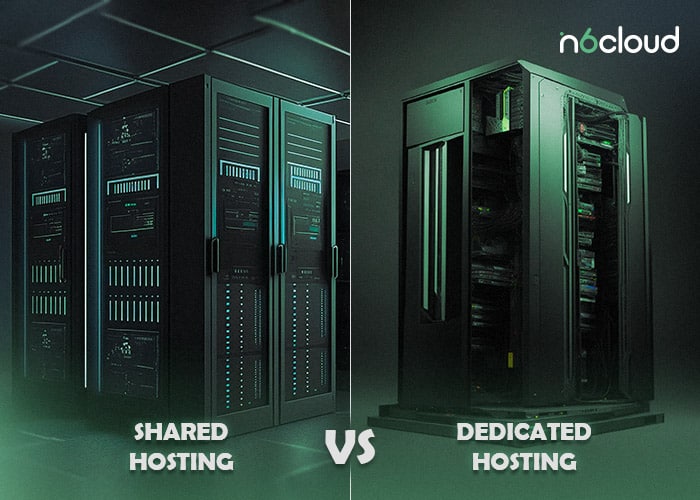Are you looking to start an online project or business but need help determining the best web hosting option to sign up for? Consider the various possibilities between shared and dedicated hosting.
Both have benefits and trade-offs regarding features, pricing, and scalability; however, understanding the difference is key for making the most informed decision. Today’s blog post outlines these differences so that you can determine which type suits your needs better!
Overview of Shared Hosting and Dedicated Hosting
There are two main options: shared hosting and dedicated hosting. Shared hosting involves multiple websites sharing a single server and its resources, while dedicated hosting provides a server exclusively for one website.
While shared hosting may be cost-effective, dedicated hosting often needs more customizable features and performance capabilities.
On the other hand, dedicated hosting provides complete control over server configuration and resources, allowing for optimal performance and security. Ultimately, choosing between dedicated hosting vs shared hosting depends on the specific needs and goals of the website owner.
Advantages and Disadvantages of Shared Hosting
There are two main options for web hosting and difference between shared hosting and dedicated hosting. Shared hosting involves multiple websites sharing the same server resources, whereas a dedicated server offers complete control and access to resources for a single website.
There are advantages to both options, and it ultimately depends on the individual needs of the website in question. Shared hosting is often more cost-effective and easier to manage, making it a popular choice for smaller websites or those without high traffic.
However, shared hosting has potential drawbacks, such as limited resources and security issues. On the other hand, dedicated servers offer unparalleled control and resources but come with a much higher cost and a steeper learning curve for management. Ultimately, the decision between shared hosting and a dedicated server will depend on each website’s unique requirements and priorities.
Advantages and Disadvantages of Dedicated Hosting
While dedicated hosting provides total control over your server, shared hosting entails several websites sharing a single server.
While dedicated hosting has several advantages, such as improved speed and security, disadvantages include greater pricing and a more difficult learning curve.
The major benefit of dedicated hosting is that you have complete control over your server, allowing you to adapt it to your requirements. In contrast to shared hosting, you may configure your server to fit the specific needs of your website or application without worrying about how the performance of other websites will affect it.
However, this level of control comes at a cost, and dedicated hosting is typically more expensive than shared hosting. Additionally, if you need to become more experienced with server administration, you may need to learn how to manage your server effectively.

Dedicated Hosting vs Shared Hosting | Cost Comparison
When selecting a hosting plan, it’s essential to consider the difference between shared hosting and dedicated hosting. Several websites share the same server resources in shared hosting, making it a popular and affordable alternative.
The resources of a whole server are made available to one website with dedicated hosting, which enables superior speed and customization. Ultimately, the choice between the two depends on the website’s size, volume, and requirements.
Dedicated hosting is the best option for websites with significant traffic volumes and resource-intensive applications that demand total administrative control, albeit more expensive. Small to medium-sized organizations that need a certain amount of resources are better suited for shared hosting.
Careful consideration of the differences between these two hosting options will help you make an informed decision that aligns with your website’s needs and budget.
When to choose Shared Hosting or Dedicated Hosting
Deciding between shared and dedicated hosting can be challenging for any business owner. Both options have benefits and drawbacks; choosing the wrong option can result in decreased website performance or wasted resources.
Canadian shared web hosting may be the better option for small businesses or websites with low traffic, as it is cheaper and allows for a certain amount of flexibility in resource usage. On the other hand, dedicated hosting is better suited for larger websites with high traffic, as it provides exclusive access to all resources and greater reliability.
Ultimately, the decision between shared hosting vs dedicated hosting should be based on your business’s specific needs and goals, considering factors such as budget, website traffic, and growth potential.
Dedicated Server vs Shared hosting | security considerations
Security considerations are of the utmost importance when choosing a hosting option for your website. Two of the most common options are dedicated hosting and shared hosting.
A dedicated server offers exclusive access to all the resources of a server, while shared hosting involves sharing server resources with other websites. Dedicated hosting minimizes security risks since you have control over security protocols, software installations, and other server configurations.
On the other hand, shared hosting comes with more inherent security risks, particularly vulnerabilities that can arise from neighboring websites on the same server. It’s essential to weigh these security considerations and other factors in deciding which hosting option best suits your needs.
Conclusion
Ultimately, understanding the differences between shared hosting and dedicated hosting can help an individual or a business make an informed decision. Shared hosting may be sufficient for personal websites or small businesses with a limited budget and technical needs.
Still, dedicated hosting is preferable for larger organizations requiring greater control and scalability. Besides cost considerations, other factors such as speed, uptime, performance, security requirements, and even environmental factors should all be key when weighing the differences between these two web hosting models.
Of course, finding the best option will involve researching different service providers to compare costs and features. Consider getting Canadian dedicated servers from reliable service providers to ensure you get the most value.
Don’t just settle for standard services – get what fits your needs! With so many reliable options available today, there’s no better time to get the perfect hosting solution tailored to your specific requirements.

